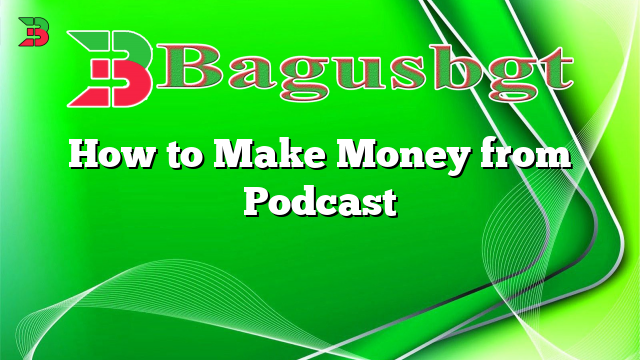Hello! Are you passionate about podcasting and interested in turning your hobby into a profitable venture? In this article, we will explore various strategies and techniques to help you monetize your podcast and generate income. Read on to discover how to make money from podcasting.
1. Sponsorships and Advertising
One of the most common ways podcasters make money is through sponsorships and advertising. By partnering with relevant brands or companies, you can promote their products or services during your podcast episodes. This can be done through pre-roll, mid-roll, or post-roll advertisements, where you endorse the sponsor’s offerings to your listeners.
Advantages:
- Provides a steady source of income if you have a loyal and engaged audience.
- Allows you to align with brands that resonate with your podcast’s theme and values.
Disadvantages:
- May require a significant listener base before attracting potential sponsors.
- Could potentially alienate some listeners if the advertisements disrupt the flow of your content.
2. Crowdfunding and Donations
If your listeners appreciate the value you provide through your podcast, they may be willing to support you financially. Platforms like Patreon or Ko-fi allow you to set up donation pages or offer exclusive content to your patrons in exchange for their contributions.
Advantages:
- Provides a direct and personal connection with your audience, fostering a sense of community and appreciation.
- Can be a reliable source of income if you have dedicated fans who are willing to contribute regularly.
Disadvantages:
- Relies heavily on the goodwill and generosity of your listeners.
- May require consistent and valuable content to maintain the support of your patrons.
3. Merchandise Sales
Create and sell merchandise related to your podcast, such as t-shirts, mugs, or stickers. This allows your listeners to show their support while also promoting your brand.
Advantages:
- Offers an additional revenue stream and a way to engage with your audience beyond the podcast.
- Increases the visibility of your podcast through branded merchandise.
Disadvantages:
- Requires initial investment and ongoing management of inventory, shipping, and customer service.
- Success depends on the appeal of your merchandise and the willingness of your audience to make purchases.
4. Paid Memberships
Consider offering exclusive content or bonus episodes to your loyal listeners through a paid membership model. This can be done through platforms like Podia or Supercast.
Advantages:
- Provides a recurring source of income.
- Allows you to offer premium content to your most dedicated fans.
Disadvantages:
- Requires consistently valuable content to justify the subscription fee.
- May limit your reach as some listeners may not be willing to pay for access.
5. Live Events and Workshops
Organize live events, workshops, or webinars related to your podcast’s topic. Charge a fee for attendees to participate and learn from you in person.
Advantages:
- Allows you to connect with your audience on a more personal level.
- Offers an opportunity to showcase your expertise and expand your network.
Disadvantages:
- Requires additional planning, resources, and marketing efforts.
- Dependent on the availability and interest of your target audience.
6. Affiliate Marketing
Partner with companies or individuals and promote their products or services as an affiliate. You earn a commission for every sale or referral made through your unique affiliate link.
Advantages:
- Allows you to monetize your recommendations and earn passive income.
- Can be integrated seamlessly into your podcast episodes without disrupting the listener experience.
Disadvantages:
- Requires careful selection of affiliate partners to ensure alignment with your audience’s interests and needs.
- Success depends on the effectiveness of your promotional efforts and the willingness of your audience to make purchases.
7. Licensing and Syndication
If your podcast becomes popular and gains a significant following, you may have the opportunity to license or syndicate your content to other platforms or media outlets. This can generate income through licensing fees or revenue sharing agreements.
Advantages:
- Expands your podcast’s reach and exposes it to new audiences.
- Provides additional income streams without requiring direct listener support.
Disadvantages:
- Requires a high-quality and unique podcast that stands out among the competition.
- May involve relinquishing some control over your content or brand.
8. Consultation and Coaching
If you have expertise in a specific field or niche, offer consultation or coaching services to your listeners. This can be done through one-on-one sessions, group coaching programs, or online courses.
Advantages:
- Allows you to leverage your podcast’s credibility and build deeper relationships with your audience.
- Provides a higher-priced offering for those seeking personalized guidance or knowledge.
Disadvantages:
- Requires a significant level of expertise and the ability to deliver value through your services.
- May limit the audience due to the higher cost associated with consultation or coaching.
9. Public Speaking Engagements
Use your podcast as a platform to showcase your expertise and secure speaking engagements at conferences, events, or industry gatherings. You can charge a fee for your speaking services.
Advantages:
- Provides additional visibility and credibility for your podcast and personal brand.
- Offers an opportunity to network with industry professionals and expand your reach.
Disadvantages:
- Requires excellent public speaking skills and the ability to deliver engaging presentations.
- Dependent on the availability of speaking opportunities and the demand for your expertise.
10. Repurposing and Selling Content
If you have a large collection of valuable and informative podcast episodes, consider repurposing them into e-books, online courses, or digital downloads. You can sell these products to your audience.
Advantages:
- Allows you to monetize your existing podcast content without creating new episodes.
- Provides a more comprehensive and organized format for your listeners to consume your knowledge.
Disadvantages:
- Requires additional time and effort to transform your podcast episodes into sellable products.
- Success depends on the perceived value and demand for your repurposed content.
Conclusion
In conclusion, monetizing your podcast requires a combination of creativity, dedication, and strategic thinking. Explore the various options available, experiment with different approaches, and listen to the feedback and preferences of your audience. Remember, building a successful and profitable podcast takes time, so stay consistent, provide value, and enjoy the journey towards financial success.
 Bagus Banget Kumpulan Informasi terbaru dari berbagai sumber yang terpercaya
Bagus Banget Kumpulan Informasi terbaru dari berbagai sumber yang terpercaya



